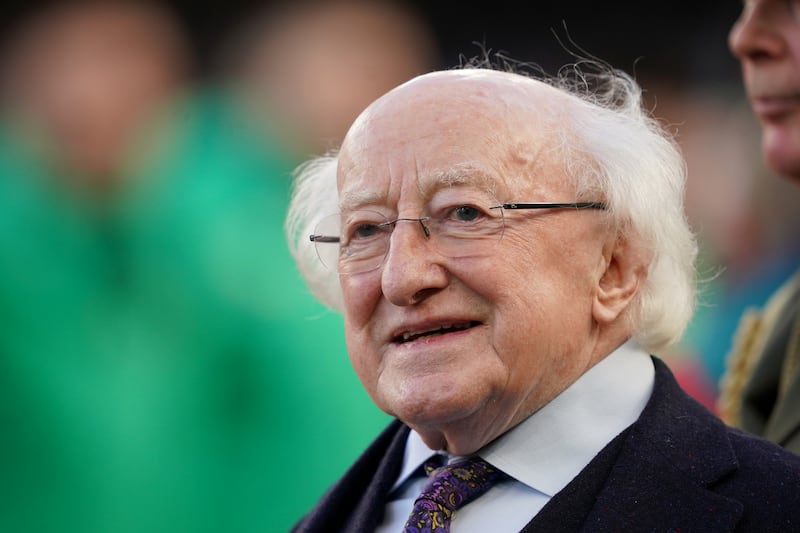Strong and specific apologies from the IRA and the Irish state for its historical treatment of non-Catholics could help to “change hearts and minds” over unification, Leo Varadkar has said.
The former premier said it had to be acknowledged that in its first decades of existence the Irish state was “sectarian in character”
He also said he believed the next Dublin government should consider using its budget surplus to set up a fund to prepare for the economic challenges of Irish unity.
Mr Varadkar was speaking at the Ireland’s Future event in Belfast on Saturday.
He told the rally that while he did not hold any government position any more, he still wanted to advocate for unity.
Mr Varadkar said: “I think it is really important that the belief in unification isn’t seen to be the preserve of any one particular party or one or two parties, it needs to be all parties and no party.
“I think one of the most important things that we need to do is to make sure we maximise support for that and reach out to people who may be unenthusiastic about it south of the border and those who aren’t convinced or don’t support it yet here north of the border.”
Putting its money where its mouth is: a sovereign wealth fund for Irish Unity - former Taoiseach @LeoVaradkar sets out his idea to @jimfitznews at the @IrelandsFuture event in Belfast pic.twitter.com/qZF4QHiTLV
— The Irish News (@irish_news) June 15, 2024
Mr Varadkar said he hoped that under the next Irish government “what is a longstanding political aspiration towards unification becomes a political objective”.
He said: “It means actively working towards it, preparing the ground for it, for the financial implications, talking about the model, the new constitution, what it might look like.
“But I think for good reasons we prioritised the deal around Brexit, prioritised having the (Stormont) institutions functioning, and it is important that we don’t do anything that might destabilise them.”

He added: “I think this (planning for unification) could be best done in a scenario where the Assembly, the Executive, the north south bodies are all operating.”
The former Taoiseach said he was reluctant to set a target date for a unity referendum, but said he would like to see a conversation about what the criteria for calling a poll would be.
Backstage at @IrelandsFuture - is 2030 a realistic timeframe for a border poll? @jimfitznews asks those taking part pic.twitter.com/rY5Pt3SxhW
— The Irish News (@irish_news) June 16, 2024
He also predicated a united Ireland would be an economic success.
Mr Varadkar said: “I don’t buy the idea that it will cost 20 billion euro a year or anything close to that.
“But there will be a cost.”
He said when he was Taoiseach a number of funds had been set up to prepare for the future.
“We could set up a fund as well and start setting aside some of the surplus to prepare for that transition period.
“The basic principle, which is a prudent one, at a time when we have a surplus and we won’t have a surplus forever, we are setting aside money for costs that we know are going to rise like climate action, like infrastructure, like pensions.
“I think it is reasonable to apply that same logic to unification and to start to set aside money now to ease that transition and also to reassure people who might be worried there will be an economic cost to them.”
Mr Varadkar was then asked if, as part of a unity process, the IRA should apologise to victims or the Irish state for its past treatment of non-Catholics.
He said: “I think we should certainly acknowledge that the first few decades of the Irish free state and the Irish state which followed was sectarian in character.”

Mr Varadkar added: “I think we have to acknowledge that for quite some time the Irish state gave the Catholic church a special position and therefore treated minorities as if they were in a different position.
“I think we have to acknowledge that.
“In terms of apologies I think apologies are appropriate but you have to be careful about them.
“You can only apologise for things that happened, it has to be authentic, you’ve to mean it.
“And you have to know it will be accepted too.
“I often hear people who were republicans, who would have been supporters or involved in the IRA in the past, when they give apologies it is kind of a general language, apologies for what happened and everyone suffered and what everyone did.
“I think if we are going to start to change minds and hearts among Protestant people, a much more stronger, specific apology for what was done and what we did, I think would help to change the hearts and minds.”







